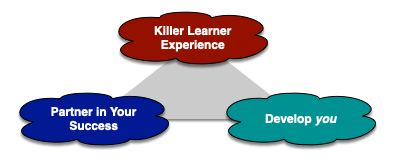The wise Ellen Wagner has a neat post about what should be the ‘ten commandments’ of online learning. I agree with them, and recommend them to you. I have thought about it in a slightly different, but similar frame.
I came up with this as I was trying to suggest what the core value propositions (yeah, I said it, deal with it) of an online offering should be. And I tried to frame it the way I thought Steve Jobs might:
 An absolutely killer learning experience
An absolutely killer learning experience- We don’t just develop your understanding, we develop you
- We’re your partner for your success
What I mean by a killer learning experience is one that is engaging and effective, ie all the principles of Engaging Learning. It’s a pedagogy that’s challenging, meaningful, relevant, tightly coupled, and more. It’s also social, having you learn with others, not just on your own.
Developing the person means not only developing their knowledge of the topic, their degree, but also their success factors. That includes things like helping them develop a portfolio of work, developing skills in working with others, communicating, etc. In essence, layered on top of the domain knowledge are 21st century skills, which are likely to be the only lasting value you can provide learners (c.f. Father Guido Sarducci’s 5 Minute University).
And finally, it’s about not just providing the content and having the learner sink or swim, but instead actively looking at the learner’s performance, finding ways to scaffold the learning and being attentive to signals of potential trouble. It’s data-driven adaptivity to the individual learner, coupled optimally with human intervention. And competency-based, so the learner has clear indications of what they need to do.
We can do this, on a cost-effective basis, and I reckon it’s going to be the only sustainable differentiator to be a successful provider. The only question then becomes: who’s going to bring it all together? The market is waiting.
(warning: english as second language) Your approach is very interesting and though I agree with these core values, I question myself on the 2 lasts. I relate my questioning to your last statement “The market is waiting”. I am just wondering whether companies that implement elearning programs really want to develop their employees. Do they? They usually want them to perform better, to be up to date with legal rules, changes into their policies but that’s all. Alas, they miss the point indeed. If they would developed their employees, they would get better results and engagement.
Partner for your success: same again, i am not sure training department partner for success with the employees. Once again, they HAVE TO train them, that’s all.
So it the market waiting something that should come from companies first (in their call for tenders for instance). Online learning makers will then be able to answer these core values in one place.
Hope I am clear!
Thank you for this learnlet!
Anne-Laure, thanks for your comment. Briefly, I think going forward, only those orgs that *do* look to the latter two points will be the ones that thrive. As things move faster, a nimble workforce will be required.
i agree with you. And as an elearning expert i Will have a role to play also. Next question is: how to apply these core values? What are the success keys to implement this?
I mean concrete and practical examples.
Your three propositions are good ones. I struggle with getting my students to see any value in working together and managing “issues” in groups makes want me want to ditch even trying sometimes. Things like student evaluations for pre-tenure faculty seem to work against it too. Right now I am finding the nerve to continue with it anyway.
I often chat about not truly having a need for an expensive institutionally supported LMS. EDUCAUSE’s ELI group is focusing recently on learning analytics. Is this what you are suggesting with your “signals of potential trouble”? I worry that the analytics from those expensive LMS tools will be turned on the faculty to see things like how often we access the course, respond, etc. I am not sure I would agree with some administrators about what would be signals of potential trouble for a faculty member.
Anne-Laure, it gets into the whole institutional approach: lining up curriculum, pedagogy, infrastructure, and support systems about achieving learning.
And, yes, Chuck, I do mean analytics used to look for patterns. There’s always the possibility for abuse, but if your org is truly pursuing the vision, you’d want to be using the analytics to make faculty better, too. In ways that are authentically about helping them teach better, not extort more work. If they weren’t happy with the pedogogy, they might want to walk, but if they’re sold on it from the basis of empirical work, and everyone bought that happy faculty lead to better outcomes, I think it can be done. Not that that’s easy, but I think it is doable.
Thanks for the comments!
I would add that students not even 20 are attracted to the college experience. I suppose that is described as all the things that are fun, that you wanted to do at 18. It’s the facilities, the sports, the food, the parties, etc.